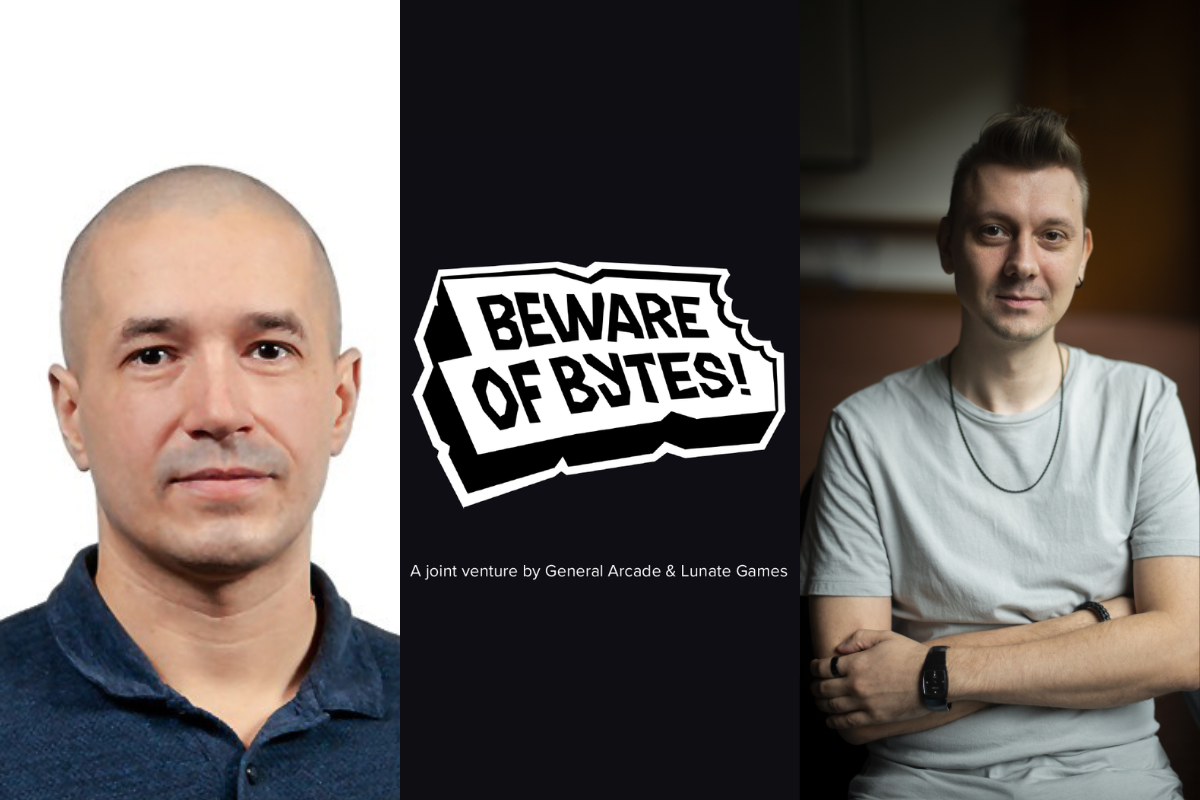In a gaming landscape where collaboration often drives innovation, Beware of Bytes! stands out as a powerful alliance between two technically accomplished studios, General Arcade and Lunate Games.
This joint venture brings together over 50+ engineers, backed by QA and art professionals, uniting strengths in Unity, Unreal, and custom engine development. From porting and co-development to network implementation and tools creation, Beware of Bytes! delivers highly specialized support to developers across the globe, including AAA studios.
At the helm of this strategic initiative are Gennadii Potapov and Andrei Morozov, two industry veterans whose combined decades of experience have shaped the venture’s mission to tackle complex projects while ensuring stability for their teams in a volatile market.
We sat down with Gennadii Potapov to discuss the formation of Beware of Bytes!, how their complementary expertise powers the venture, and what challenges and opportunities they see ahead in today’s rapidly evolving development ecosystem.
What inspired the formation of “Beware of Bytes!”? How did the idea for this joint venture come about?
It would be great to say it was a eureka moment, but in reality, it was something much more practical. We’ve known each other for quite some time. I’ve been friends with Andrei for years, and our companies were already familiar with each other, often operating in the same space and on similar kinds of projects.
Over time, it became clear that we weren’t competing as much as we were running parallel, and with complementary strengths. The General Arcade team strongly focused on Unity, custom engines, and multiplayer. Lunate brought deep expertise in Unreal, CryEngine, and custom tech as well.
So instead of continuing separately, we thought, why not combine forces? Beware of Bytes! started as a simple, natural conversation between two aligned studios, and quickly grew into a formal joint venture. It’s not just about scaling up, it’s about multiplying value by blending what each of us does best.

How is “Beware of Bytes!” a response to today’s industry challenges, and where do you see the broader future of game development heading, particularly when it comes to collaboration between studios?
The industry’s in a strange place. Rising costs, projects getting canceled, talented people being let go, and a lot of uncertainty around what’s sustainable. It’s harder than ever for small or mid-sized teams to survive alone. Beware of Bytes! is our way of adapting.
Instead of stretching thin or scaling up in a risky way, we pooled resources and knowledge. Collaboration like this is the future. We’re already seeing more cross-studio partnerships and hybrid teams forming organically. It’s not just about survival; it’s a smarter, more resilient way to build.

What kinds of benefits — technical, creative, or client-facing — have emerged from this collaboration that wouldn’t have been possible for each studio?
First, the obvious one: efficiency. With two experienced teams aligned, we can take on larger and more complex projects without sacrificing quality or burning out our teams. But the real strength lies in how the collaboration has expanded the spectrum of services and technologies we can offer.
Together, we now cover a broader range of engines. From Unity and Unreal to CryEngine and proprietary tech. This has opened the door to more diverse and technically ambitious projects. We’ve also become more flexible client-side. We can now support everything from multiplayer-heavy games to visually cutting-edge titles, across platforms.
Internally, the efficiency gains have been huge. We’ve cross-pollinated our pipelines, shared tools, and learned from each other’s workflows. There’s a lot of tech sharing going on under the hood – optimization tricks, deployment processes, QA flows – and these wouldn’t have emerged in isolation.
Even simple things like timezone coverage have made a difference. With teams distributed across regions, we can offer better client support and keep production moving almost around the clock.
Porting and remastering projects require a lot of different hardware units necessary for testing and running games. So now we are able to provide each other access to a wider range of different hardware by establishing a joint virtual network.

What kinds of challenges have you faced while merging your operations, and how have you overcome them?
Naturally, every studio has its own culture and way of doing things. The biggest challenge wasn’t technical; it was aligning workflows and expectations.
We spent a lot of time upfront just communicating. Weekly syncs, shared documentation, and ensuring everyone on both sides had access to the same info. We didn’t force a one-size-fits-all approach; instead, we built lightweight bridges where needed. Transparency and trust have been key.
What advice would you give to other small or mid-sized studios thinking about collaborating to survive and scale?
Don’t wait until it’s desperate. Start conversations when things are stable, and look for partners whose strengths genuinely complement your own.
Be brutally honest about what you’re good at and what you’re not. Shared vision matters more than matching org charts.
And finally, keep the structure flexible at first. Joint ventures don’t have to be all-in from day one. Grow into it, don’t bolt everything together too fast.

What is the long-term vision for “Beware of Bytes!”? How do you see this evolving over the next 5–10 years?
In the long term, we see Beware of Bytes! growing into a trusted name for premium co-development. The kind that’s creative, technically sharp, and deeply collaborative.
One path we’re exploring is expanding the joint venture by bringing in additional partner studios, such as art outsourcing or QA/localization teams, to round out our capabilities and offer a more complete end-to-end solution.
We’d also love to move beyond pure service work and use Beware of Bytes! as a launchpad for original IP. That’s something we’re both passionate about. However, we want to first ensure that we do it on a strong, stable foundation.
Beyond that, we’re interested in supporting others. Whether through mentorship or sharing knowledge and experience, we believe collaborations like this can help smaller studios survive and scale. If we can show this model works, we’d love to help others follow a similar path.

Co-Founder & CEO at Lunate Games

CEO at General Arcade





